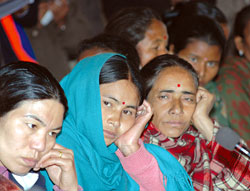 "He would be 25 today sitting beside me. I so long to hold my son," says 42-year-old Shanta Bhandari. For the last three years she has devoted her life to searching for her only son, Bipin, who disappeared when a group of police came to their house in Balaju and dragged him to their van accusing him of working for the Maoists.
"He would be 25 today sitting beside me. I so long to hold my son," says 42-year-old Shanta Bhandari. For the last three years she has devoted her life to searching for her only son, Bipin, who disappeared when a group of police came to their house in Balaju and dragged him to their van accusing him of working for the Maoists.
It was during the 2002 emergency when police were given sweeping powers to arrest anyone under the Terrorist and Disruptive Activities Act (TADA) introduced by Sher Bahadur Deuba's government. Bipin became one of its first victims.
He belonged to the Maoist-affiliated All Nepal Students' Union (Revolutionary) and soon after he was taken in, Bhandari pleaded with the police chief at Hanuman Dhoka to reveal her son's whereabouts. He promised to call her back within a week. Nearly three years have elapsed, she never heard from them.
"I know he is alive somewhere," says Bhandari hoping against all odds like the mothers of three other students who were arrested with Bipin. The mothers went everywhere, from human rights activists to the NHRC, the ICRC, the UN, the Supreme Court and even the Royal Palace. But there was no word of their disappeared sons.
Frustrated by the silence, the mothers decided to fast unto death three years ago. As news of the hunger strike spread other parents whose sons were disappeared joined the campaign. That finally pushed human rights groups to put pressure on the government, which revealed the status of 18 out of 132 disappeared persons. This resulted in the formation of the Rajya Dwara Bepatta Pariyeko Pariwar Samaj (Society of Families of Persons Disappeared by the State).
Last month, members of the Society locked up the NHRC for five hours to pressure it to urge the government to locate the disappeared. "NHRC only raises its voice against Maoist activities but hardly says anything about the human rights abuses of the state authorities," says Bhandari.
Despite a Supreme Court order, the government's investigative committee on disappeared people under the Ministry of Home Affairs has probed only 36 out of roughly 800-1,100 people that local rights groups say have been disappeared by the state. The National Working Committee of Disappearances, set up with help from the UN's human rights office here, says it will finish confirming reports within a month and then start filing cases at the Supreme Court.
"The numbers are hard to confirm because many families are afraid to report cases of either disappearances or those who have been released from detention," says advocate Kopila Adhikari of the group, Advocacy Forum which has registered around 550 cases of disappearances from over 25 districts since 2001.
So far only those living in or near cities, especially Kathmandu, have been able to register cases. Those living in villages are either not aware or don't have the courage to share confidential information about their disappeared relatives.
Nepal topped the list of countries in the number of disappearances between2003-4, according to UN Group on Enforced and Involuntary Disappearances.
nternational and national groups say they have focused less on disappearances by the Maoists because the rebels openly execute those they abduct for spying on the government's behalf or for defying their party.
The families of the disappeared are running out of patience. "If the state fails to act soon, we are going to lock Singa Durbar up and we don't care if we die," says Bhandari whose husband also had to run away from home after the family received threats on behalf of the disappeared. Bhandari lives with her 17-year-old daughter in Balaju. She says she is not afraid of anything anymore.
PIC: KIRAN PANDAY


